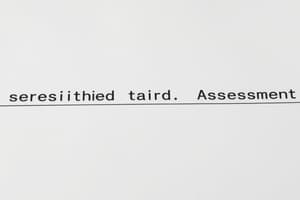Podcast
Questions and Answers
What is the definition of assessment in the context of personality?
What is the definition of assessment in the context of personality?
- The measurement of physical health
- None of the above
- The characteristic way of feeling, thinking, perceiving, and acting (correct)
- The measurement of intelligence
What is the most accepted structural or descriptive theory of personality?
What is the most accepted structural or descriptive theory of personality?
- The 16 Personality Factor Questionnaire
- The Five Factor Model (correct)
- The NEO PI-3
- The Minnesota Multiphasic Personality Inventory
What are self-report inventories?
What are self-report inventories?
- Instruments for measuring physical health
- Inventories for measuring intelligence
- Questionnaires for assessing personality (correct)
- None of the above
What is the normative sample in self-report inventories?
What is the normative sample in self-report inventories?
What is the potential problem with self-report inventories assuming that the respondent has an accurate perception of themselves?
What is the potential problem with self-report inventories assuming that the respondent has an accurate perception of themselves?
What is the difference between the MMPI and the 16PF?
What is the difference between the MMPI and the 16PF?
What is the focus of the MCMI-4?
What is the focus of the MCMI-4?
What are response style indices in personality assessment?
What are response style indices in personality assessment?
What is the premise of the MBTI?
What is the premise of the MBTI?
What is the main criticism of the MBTI?
What is the main criticism of the MBTI?
What is the focus of personality assessment in this lecture?
What is the focus of personality assessment in this lecture?
What is the definition of assessment in the context of personality?
What is the definition of assessment in the context of personality?
What is the difference between general process theories and structural or descriptive theories?
What is the difference between general process theories and structural or descriptive theories?
What is the most accepted structural or descriptive theory of personality?
What is the most accepted structural or descriptive theory of personality?
What are self-report inventories?
What are self-report inventories?
What is the normative sample in self-report inventories?
What is the normative sample in self-report inventories?
What is the potential problem with self-report inventories assuming that the respondent has an accurate perception of themselves?
What is the potential problem with self-report inventories assuming that the respondent has an accurate perception of themselves?
What is the difference between the MMPI and the 16PF?
What is the difference between the MMPI and the 16PF?
What is the focus of the MCMI-4?
What is the focus of the MCMI-4?
What are response style indices in personality assessment?
What are response style indices in personality assessment?
What is the premise of the MBTI?
What is the premise of the MBTI?
What is the main criticism of the MBTI?
What is the main criticism of the MBTI?
Which of the following is NOT a domain of personality assessment?
Which of the following is NOT a domain of personality assessment?
What is the definition of personality assessment?
What is the definition of personality assessment?
What is the difference between general process theories and structural or descriptive theories of personality?
What is the difference between general process theories and structural or descriptive theories of personality?
What is the most accepted structural or descriptive theory of personality?
What is the most accepted structural or descriptive theory of personality?
What is the purpose of self-report inventories in personality assessment?
What is the purpose of self-report inventories in personality assessment?
What is a potential issue with self-report inventories in personality assessment?
What is a potential issue with self-report inventories in personality assessment?
What is the purpose of the Minnesota Multiphasic Personality Inventory (MMPI)?
What is the purpose of the Minnesota Multiphasic Personality Inventory (MMPI)?
What is the purpose of the 16 Personality Factor Questionnaire (16PF)?
What is the purpose of the 16 Personality Factor Questionnaire (16PF)?
What is the NEO PI-3?
What is the NEO PI-3?
What is the Millon Clinical Multiaxial Inventory (MCMI-4)?
What is the Millon Clinical Multiaxial Inventory (MCMI-4)?
What is the premise of the Myers-Briggs Type Indicator (MBTI)?
What is the premise of the Myers-Briggs Type Indicator (MBTI)?
What is a criticism of the MBTI?
What is a criticism of the MBTI?
Flashcards are hidden until you start studying
Study Notes
Personality Assessment: Self-Report Measures and Questionnaires
-
Personality assessment includes maximum ability and typical behavior domains, with this lecture focusing on the latter.
-
Personality is a complex construct integrating all domains of psychological study, with assessment defined as the characteristic way of feeling, thinking, perceiving, and acting.
-
Different theoretical orientations result in different types of personality tests, and understanding the theory behind the tests is critical for valid interpretation of personality test scores.
-
Personality theories can be divided into two general approaches: general process theories and structural or descriptive theories.
-
Structural or descriptive theories, also known as trait theories, deal extensively with individual differences and measurement plays a significant role.
-
The Five Factor Model is the most accepted structural or descriptive theory of personality, capturing differences between individuals on five dimensions: neuroticism, extraversion, openness, agreeableness, and conscientiousness.
-
Self-report inventories, or personality questionnaires, are standardized instruments for assessing personality, with questions written with identical instructions and response options for every participant.
-
These inventories possess psychometric properties, meaning they measure or assign a number indicating the degree of a trait present, which is then compared to standardized norms from a large, representative sample called the normative sample.
-
Self-report inventories assume that the respondent has an accurate perception of themselves and will not engage in self-deception, but response tendencies such as faking good or bad can interfere with validity.
-
The Minnesota Multiphasic Personality Inventory (MMPI) and the 16 Personality Factor Questionnaire (16PF) are two commonly used self-report measures, with the former measuring patterns of personality and emotional disorders and the latter measuring normal personality traits.
-
The NEO PI-3 is another self-report measure based on the five-factor model of personality traits, while the Millon Clinical Multiaxial Inventory (MCMI-4) focuses on DSM-5 personality disorders.
-
Interpretation of self-report inventories involves examining response style indices, global factor scores, and primary factor scores, with extreme scores being the focus of attention.Overview of Personality Scales and the Myers-Briggs Type Indicator (MBTI)
-
Personality scales involve self-statements rated as true or false to detect disordered personality patterns.
-
Scales include indices for clinical personality patterns, severe pathology, clinical syndromes, and modifying indices.
-
Response style indices must be examined before global or individual factor scores for interpretation.
-
The tests are not diagnostic but provide valuable information about personality traits and tendencies.
-
Debasement, disclosure, invalidity, and inconsistency are examples of response styles.
-
The MBTI is commonly used in organizational settings for selection and team placement.
-
It was developed in 1962 by Myers and revised in 1985.
-
The MBTI's premise is that people have definite preferences in how they approach, receive and make conclusions about the world.
-
The MBTI measures four bipolar dimensions: extroverted/introverted, sensation/intuition, thinking/feeling, and judgment/perception.
-
Scores indicate a type rather than falling on a continuum, with 16 possible types.
-
The MBTI uses an ipsative approach and forced-choice format.
-
Criticisms of the MBTI include poor test-retest reliability and construct validity, with 35% of individuals having a different type after four weeks.
Studying That Suits You
Use AI to generate personalized quizzes and flashcards to suit your learning preferences.




